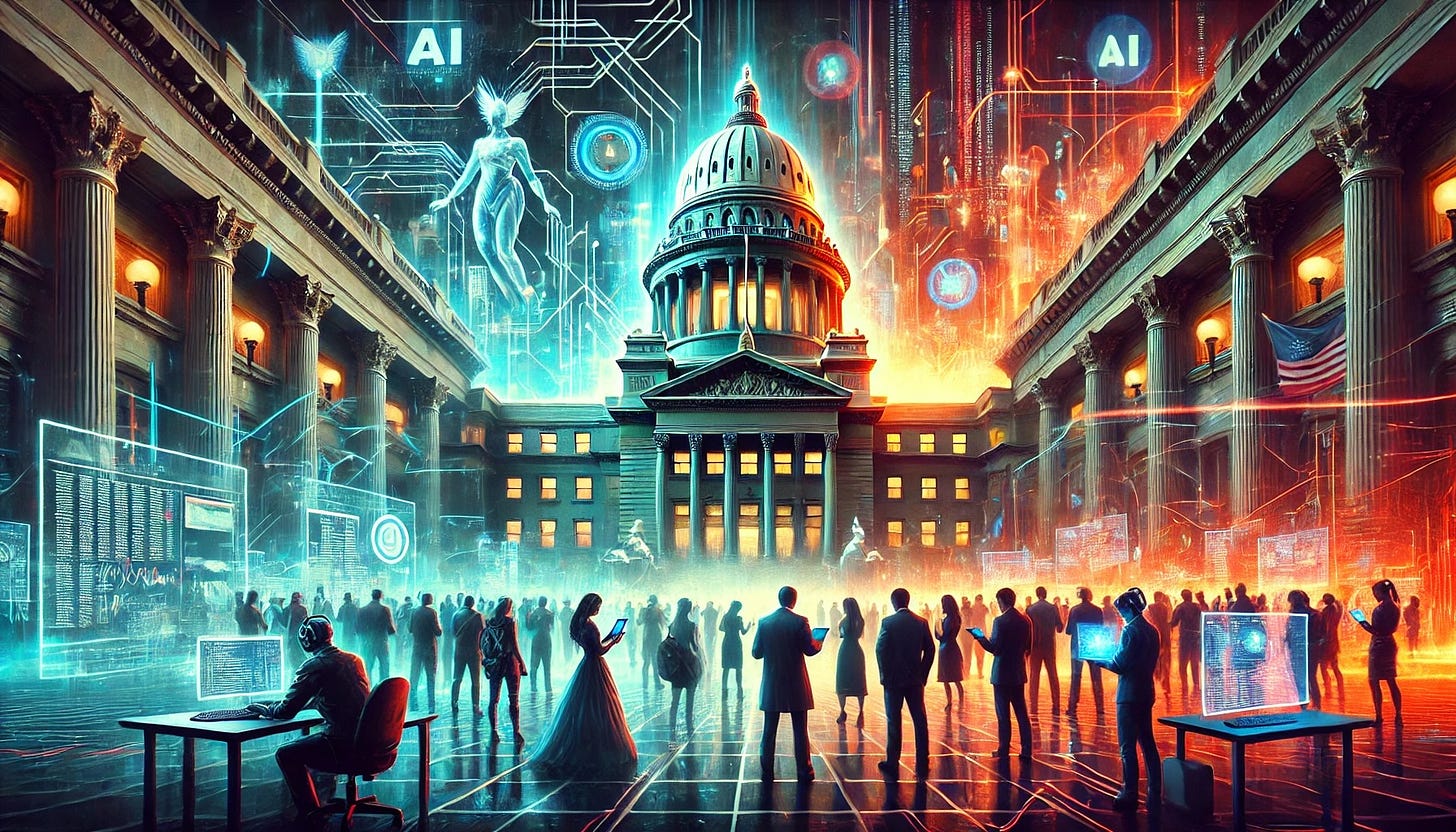Idaho in the Balance
AI, HB 345, and the Fight for Accountability
I return with an urgent update on House Bill 345—not just as a policy debate, but as a warning about AI governance unfolding in real-time. In the weeks since my last post, HB 345 has rapidly advanced, hearings have intensified, and the intersection of AI and political power has become impossible to ignore. This is the real AI doomsday—government automation that enforces suffering at scale.
The Rapid Acceleration of HB 345 and AI’s Role in Governance
Policies that once took months or years to implement are now happening at machine speed. Legislators are rushing through HB 345, just as they celebrated HB 40’s massive tax cuts—without meaningful debate, without oversight, and without public consent.
Why? Because AI makes governance faster, less accountable, and dangerously efficient.
AI-driven Medicaid fraud detection systems are already denying benefits to people before human review even happens. UnitedHealth’s AI-led denials forced families to pay $12,000/month out-of-pocket after an algorithm overruled doctors. (Financial Times)
The Centers for Medicare and Medicaid Services (CMS) warned that AI is creating false fraud accusations, causing wrongful terminations of Medicaid benefits and leaving vulnerable populations with no recourse. (ICF.com)
Now, Idaho’s DOGE Task Force is poised to accelerate AI use in government decision-making. Without oversight, AI will not be used to help people—it will be used to cut costs, limit access, and enforce bureaucratic control at an inhuman scale.
AI Governance: A Tool for Good or an Engine for Harm?
This is the fear that AI doomers have warned about—not killer robots, but automated oppression hidden behind bureaucratic efficiency.
Medicaid AI fraud detection was supposed to increase efficiency. Instead, it wrongfully denies life-saving care.
Work requirements are being automated, making appeals impossible for those flagged as ‘noncompliant’—whether true or not.
Government automation is replacing human decision-making, allowing policies like HB 345 to move at speeds that prevent public resistance.
HB 345 is just the beginning. The DOGE Task Force will push AI deeper into Medicaid, labor policies, and social services—meaning AI will decide who receives healthcare, who qualifies for aid, and who gets left behind.
How We Stop This—Now
We are at a critical moment—if we do not intervene now, AI-driven policy enforcement will become the default. The fight against HB 345 is the fight for AI accountability, transparency, and justice.
1. Expose the Pattern
We must connect the dots between AI-driven policy enforcement and human suffering:
HB 345 uses AI to ration Medicaid.
HB 40 redistributes wealth upwards while cutting services.
The DOGE Task Force will automate austerity policies, making suffering ‘efficient.’
2. Demand AI Oversight—Before It’s Too Late
AI governance must be transparent, accountable, and challengeable—not hidden behind bureaucratic automation. We must demand:
Full disclosure of AI’s role in Medicaid decisions.
A moratorium on AI-driven benefit cuts until fairness safeguards are implemented.
Public accountability measures ensuring AI is used to assist, not punish, people in need.
3. Organize at the Speed of AI
AI makes policy changes happen faster—we must match that speed with awareness, resistance, and action.
Call your state senators—demand they vote NO on HB 345.
Expose AI’s role in Medicaid denials—report and track wrongful denials.
Push for AI regulation NOW—before AI governance becomes irreversible.
AI for Good, Not for Harm
AI should be a tool to help people, not a weapon to control them. If AI is to play a role in Medicaid, it should be designed to ensure universal access, prevent bias, and protect the vulnerable—not to enforce austerity with machine efficiency.
How You Can Use AI to Fight for Justice
AI is not just in the hands of policymakers—it’s in your hands too. Here’s how you can use AI for good to expose misinformation, challenge policy decisions, and educate the public:
1. Extract Data from Public Records
AI can analyze laws, legislative meeting notes, video/audio recordings, and press releases. Use AI to pull key insights from massive amounts of data faster than policymakers can hide them. Here are key Idaho public records portals:
Transparent Idaho (transparent.idaho.gov) – Government financial records & spending
Idaho iCourt Portal (icourt.idaho.gov) – Court case records
Idaho Legislature Archives (legislature.idaho.gov) – Bills, hearings, & transcripts
Public Records Law Manual (ag.idaho.gov) – How to request Idaho public records
2. Ask AI to Search Beyond Idaho
AI can surface news, policies, and legal precedents from other states, exposing patterns of harmful policies before they spread further. If Idaho lawmakers attempt to limit transparency, other states' records can provide insights into their tactics.
3. Challenge Misinformation in Real-Time
When politicians push misleading narratives, question them using AI. Ask AI for sources, verification, and alternative perspectives.
4. What to Do if Public Record Sites Go Down
Unfortunately, we’ve seen key public record sites become inaccessible during critical legislative moments. Here’s how to respond:
Check the Idaho State Status Page (status.sco.idaho.gov)
Use Google Cache or the Wayback Machine (archive.org) to retrieve previous versions
File Direct Public Records Requests (ag.idaho.gov) under Idaho’s Public Records Act (Title 74, Chapter 1)
Look for alternative news sources—local journalists may still have access to critical information
5. Synthesize and Educate the Public
AI can help summarize complex policies into clear, actionable knowledge. Use AI to create fact sheets, social media posts, and easy-to-read breakdowns for those who need it most.
6. Engage with AI-Driven Research
Don’t just accept what’s presented—use AI to ask deeper questions. Cross-check sources, investigate financial ties, and uncover what policymakers aren’t telling the public.
AI should empower people, not silence them. Question everything policymakers put forward using AI, demand transparency, and use technology to educate, organize, and fight for justice.


